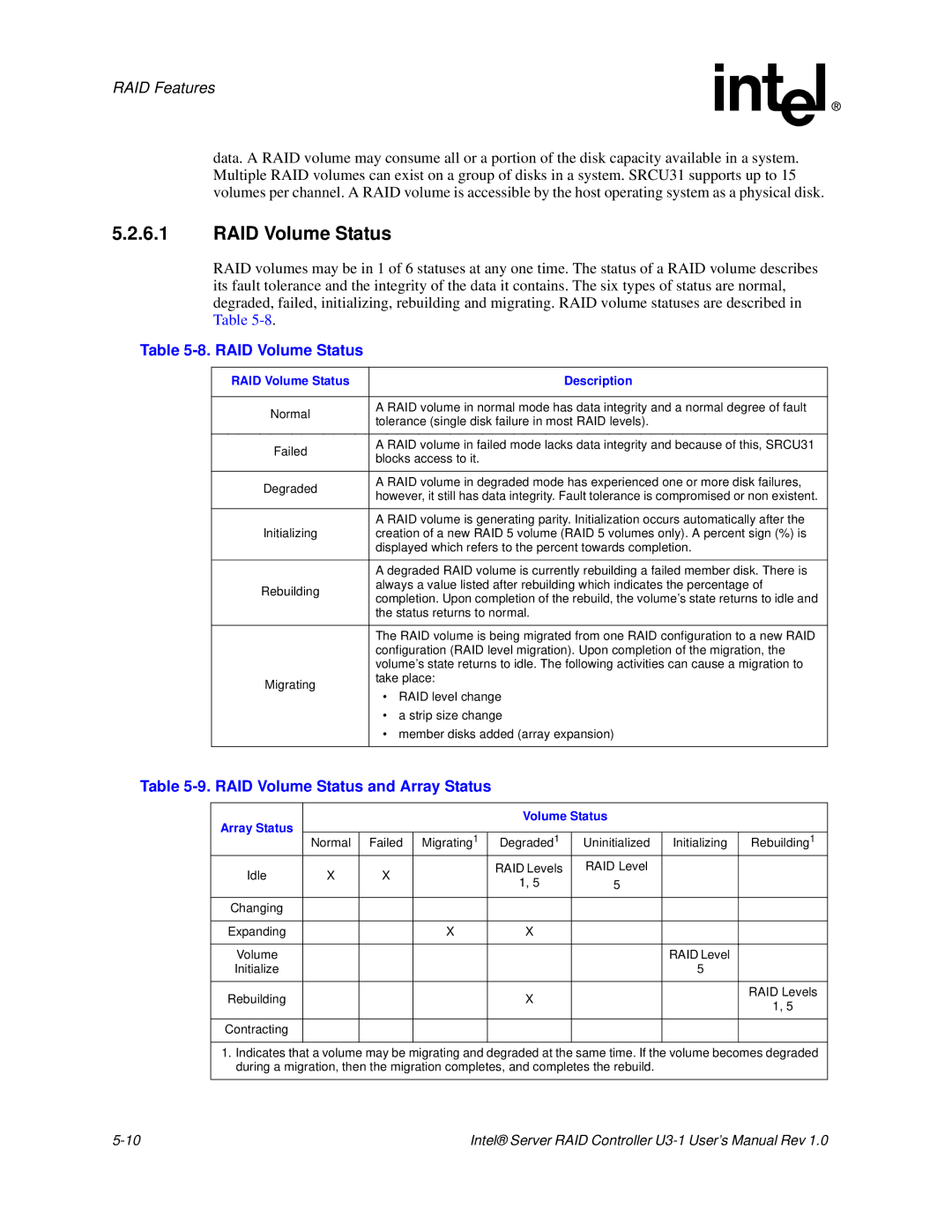
RAID Features
data. A RAID volume may consume all or a portion of the disk capacity available in a system. Multiple RAID volumes can exist on a group of disks in a system. SRCU31 supports up to 15 volumes per channel. A RAID volume is accessible by the host operating system as a physical disk.
5.2.6.1RAID Volume Status
RAID volumes may be in 1 of 6 statuses at any one time. The status of a RAID volume describes its fault tolerance and the integrity of the data it contains. The six types of status are normal, degraded, failed, initializing, rebuilding and migrating. RAID volume statuses are described in Table
Table 5-8. RAID Volume Status
RAID Volume Status | Description | |
|
| |
Normal | A RAID volume in normal mode has data integrity and a normal degree of fault | |
tolerance (single disk failure in most RAID levels). | ||
| ||
|
| |
Failed | A RAID volume in failed mode lacks data integrity and because of this, SRCU31 | |
blocks access to it. | ||
| ||
|
| |
Degraded | A RAID volume in degraded mode has experienced one or more disk failures, | |
however, it still has data integrity. Fault tolerance is compromised or non existent. | ||
| ||
|
| |
| A RAID volume is generating parity. Initialization occurs automatically after the | |
Initializing | creation of a new RAID 5 volume (RAID 5 volumes only). A percent sign (%) is | |
| displayed which refers to the percent towards completion. | |
|
| |
| A degraded RAID volume is currently rebuilding a failed member disk. There is | |
Rebuilding | always a value listed after rebuilding which indicates the percentage of | |
completion. Upon completion of the rebuild, the volume’s state returns to idle and | ||
| ||
| the status returns to normal. | |
|
| |
| The RAID volume is being migrated from one RAID configuration to a new RAID | |
| configuration (RAID level migration). Upon completion of the migration, the | |
| volume’s state returns to idle. The following activities can cause a migration to | |
Migrating | take place: | |
• RAID level change | ||
| ||
| • a strip size change | |
| • member disks added (array expansion) | |
|
|
Table 5-9. RAID Volume Status and Array Status
Array Status |
|
|
| Volume Status |
|
| |
|
|
|
|
|
|
| |
| Normal | Failed | Migrating1 | Degraded1 | Uninitialized | Initializing | Rebuilding1 |
Idle | X | X |
| RAID Levels | RAID Level |
|
|
| 1, 5 | 5 |
|
| |||
|
|
|
|
|
| ||
|
|
|
|
|
|
|
|
Changing |
|
|
|
|
|
|
|
|
|
|
|
|
|
|
|
Expanding |
|
| X | X |
|
|
|
|
|
|
|
|
|
|
|
Volume |
|
|
|
|
| RAID Level |
|
Initialize |
|
|
|
|
| 5 |
|
|
|
|
|
|
|
|
|
Rebuilding |
|
|
| X |
|
| RAID Levels |
|
|
|
|
| 1, 5 | ||
|
|
|
|
|
|
| |
|
|
|
|
|
|
|
|
Contracting |
|
|
|
|
|
|
|
|
|
|
|
|
|
|
|
1.Indicates that a volume may be migrating and degraded at the same time. If the volume becomes degraded during a migration, then the migration completes, and completes the rebuild.
Intel® Server RAID Controller |
